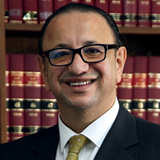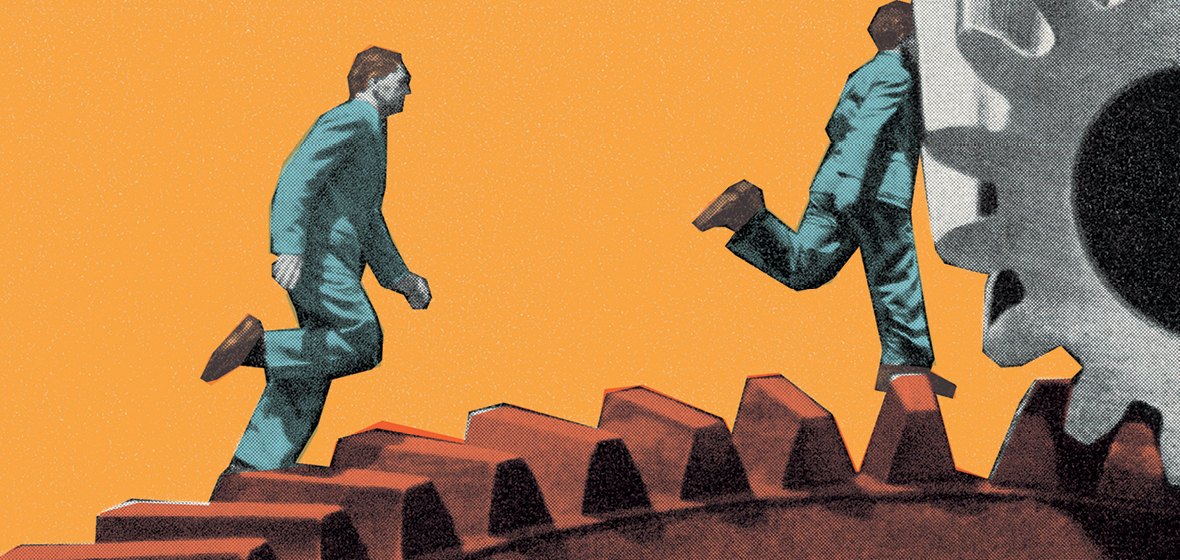For those in custody we find ourselves in a predicament … making their incarceration more demanding and more onerous. That’s being reverberated around the system.
The criminal justice system almost ground to a halt in recent months. It has caused delays so severe that human rights questions are being raised.
The wheels of justice will crank into a higher gear this month, with jury trials set to resume at the Downing Centre, Parramatta and Newcastle District Courts on 15 June. The Local Court is also discussing preliminary arrangements for the return of normal sittings. Subject to advice from Corrective Services, the Chief Magistrate says matters pending in the Local Court’s criminal jurisdiction may be dealt with to finality from 1 June, starting with sentencing in cases with custody considerations.
It’s the first sign of light on the horizon since the outbreak of COVID-19 essentially crippled the criminal courts, forcing the cancellation of all jury trials. Lengthy delays, which have been an issue for some time, are becoming exponentially worse as the list of unresolved matters continues to grow. The disruptions have left many waiting for answers, with a particularly severe impact on those remanded in custody – indefinitely – awaiting bail hearings and trials. Experts say it’s a human rights concern, not just because justice delayed is justice denied, but because of undue hardships.
Lawyers tell LSJ many clients are fearful of being exposed to the virus in prison, due to heightened risks in a confined population. Mental health issues, aggravated by indefinite periods of incarceration, harsh preventative lockdowns, cancellation of family visits and reduced access to legal counsel are also concerns. Vulnerable members of the community are disproportionately affected.
A system on a knife edge
John Vizzone, a partner at Vizzone Ruggero Twigg Lawyers in Mascot, says the Local Court disruptions have had a severe impact on the lives of some clients – even if they’re lucky enough to be on bail. One matter he is working on, for a client appealing an apprehended violence order (AVO), was originally set to be mentioned in October 2019. However, one of the witnesses was ill, so the matter was pushed back to April 2020. It’s now been adjourned to August, but Vizzone isn’t confident it will go ahead even then.
“Presumably there’s going to be hundreds of matters at Sutherland Local Court adjourned to the same week, and it will be allocated some date in the future, and I’ve got no confidence that it’s going to be listed for hearing this year. That takes us to next year, and by that time he will have been subject to interim AVO orders for two years … By the time it’s heard in court, he’ll have served two years of an AVO of which he could be found entirely innocent, but he’s bound by the conditions,” he says.
The delay is detrimental to his client’s mental wellbeing, as well as his chance of a favourable outcome in ongoing family court proceedings. Vizzone says it speaks to a larger problem: “Everyone’s got a right to be heard by a court.”
The emotional toll is particularly hard on those who have been anticipating an outcome – one way or another – on a date set long in advance. Jahan Kalantar is a partner at Executive Legal, where he focuses on serious crime, and he says people waiting for their day in court “sit on a knife edge”.
“It’s gruelling for clients,” he says. “When jury trials have to be vacated – understandably, for public health reasons – it’s a huge weight on a client’s mind, especially for clients in custody.”
Vizzone says vacating a trial increases stress for people who often don’t have a lot of capacity to cope with the legal process, especially those from socially disadvantaged backgrounds. He adds courts may need a triage system to see what can wait, and what
cannot, once defended hearings resume.
 Elias Tabchouri
Elias Tabchouri
The developing storm
Some lawyers say the criminal courts’ delays are approaching the territory of Article Five of the Universal Declaration of Human Rights, which Australia helped develop in the 1940s. This clause promises that no-one shall be subjected to torture or to cruel, inhuman or degrading treatment or punishment.
“All clients want to have their matter finalised. All criminal matters come with anxiety,” says Elias Tabchouri, Principal at Macquarie Law Group in Burwood.
He talks LSJ through one matter, originally set for hearing in May, which is now in the “Never Never” after having been vacated. The client is subject to ongoing bail conditions, which have been a major problem, especially as Tabchouri says the man is confident of his innocence. He can only hope the matter is re-listed later this year.
“We believe in swift justice and fairness to an accused, but for those in custody – through no fault of anyone – we find ourselves in a predicament,” he says. “It’s a storm almost starting to develop, making their incarceration more demanding and more onerous. That’s being reverberated around the system.”
Prison fears
The delays have prompted a group of almost 400 experts – comprised of legal academics, barristers, solicitors and criminologists – to issue two open letters to Australian governments in recent months, advocating for early release of vulnerable and unsentenced people from custody. The list includes Indigenous Australians, the elderly, victims of domestic violence, people with chronic health issues, women, children, those serving sentences of less than six months, and those awaiting bail.
Professor Thalia Anthony, a senior lecturer in law at the University of Technology, Sydney, was one of the leaders. The criminal courts have struggled with delays for a long time, but she agrees there will be a “knock-on effect” that could mean months, or even a year, could pass before matters proceed to court.
“We believe we should start releasing people systematically,” she says, explaining there are indications that prisons are not adequately protecting the health and safety of inmates in current circumstances.
In April, a 52-year-old Victorian inmate applied for early release from Port Phillip prison on the grounds of a chronic heart condition, fearing infection because of poor sanitation. In May, three prisoners died in Queensland following harsh pandemic-related lockdowns. At least two of the deaths involved self-harm.
To date, state governments around Australia have resisted calls for early release of prisoners. However, new emergency legislation rushed through NSW Parliament in March has given Corrective Services Commissioner Peter Severin authority to order early parole for low-risk, non-violent offenders nearing the end of their sentences. The powers can be used where “reasonably necessary” to avoid the spread of COVID-19. The change came after two cases were confirmed at Long Bay Correctional Complex.
Anthony notes that governments have a duty of care to prisoners, and releasing low-risk offenders is an essential step to releasing pressure from an overwhelmed system and reducing recidivism.
“Every day that people wait without answers, especially for an unforeseeable period, is justice denied because people can’t get on with their lives,” she says. “If you look at recidivism, they’re not able to do things that would help them connect to the community to lower the risk of re-offending. They can’t get jobs, make child-minding arrangements, organise housing. That insecurity compounds every other insecurity in their lives, which makes it hard for people to get on with it in a peaceful and safe way.”
 Sarah Crellin
Sarah Crellin
We’re always concerned about having Aboriginal people in custody when they don’t need to be there, and the overrepresentation of Aboriginal people in custody overall.
Reinforcing inequality
People of Aboriginal and Torres Strait Islander descent have long been over-represented in the criminal justice system. Sarah Crellin, Principal Solicitor for the Criminal Law Practice of the Aboriginal Legal Service (ALS), says current circumstances are increasing the severity of this divide. NSW prison statistics from March indicate that 4,511 people are currently on remand. Of these, 1,133 are Indigenous.
“We’re always concerned about having Aboriginal people in custody when they don’t need to be there, and the overrepresentation of Aboriginal people in custody overall,” she says. “We know that Aboriginal people are more susceptible to disease, which makes them more susceptible to COVID-19. They’re also more likely to have respiratory illness, diabetes and other issues and we know the healthcare provided in custody isn’t good enough. We feel a lot of anxiety from the Aboriginal community at the moment.”
Crellin says the ALS has seen a significant increase in demand for bail applications since the pandemic was declared, and it has dealt with a number of matters where people were held in custody when they shouldn’t have been. In one case, a client appeared in the Dubbo hub court from Bourke, via audio-visual link (AVL). The court’s caseload prevented the matter from being heard on the day it was listed, so the client was held in custody overnight, and the next day it was dealt with through a fine.
Crellin commends the courts for embracing technology so quickly. However, she notes that delays and technical hiccups have adversely impacted the rights of some clients. She’s not alone in this concern.
Last month, NSW District Court Judge Robyn Tupman told LSJ’s Amy Dale that a single post-it note saved the day in a judge-alone virtual pre-trial hearing of a sexual assault matter. The complainant had the right to give evidence without looking at the accused; however, the court was unable to disconnect the prison camera. In the end, parties placed a humble post-it over the camera lens, creating a “low-tech solution to a high-tech problem”.
Figures from Public Prosecutions NSW show that by early May, 1,310 matters had been impacted by the precautions taken in response to the outbreak. Things have been challenging across the board, but prosecutors hope the transition to AVL will eventually improve access to justice outside the cities.
“Having worked at the ODPP’s Dubbo Regional Office, I am aware of the challenges that accompany prosecuting serious offences from remote areas of the state,” says Daniel Waldman, solicitor advocate. “The pandemic has resulted in the normalisation of conducting criminal proceedings via AVL, which I am hopeful will improve the administration of justice to the state’s regional areas.”
Seeking justice
Resuming jury trials and defended hearings are the first critical steps in reducing undue hardships on people caught in the system. Empaneling juries is an ongoing challenge. State Attorney-General Mark Speakman told LSJ’s Kate Allman that in the week before trials were suspended, only 10 per cent of 150 prospective jurors called to Nowra actually turned up. Speakman is now actively encouraging members of the public to answer their summons, reassuring them that new court protocols will ensure juror safety.
While that will help get the ball rolling again, it won’t alleviate pressure on the pre-COVID backlog, or the list of new matters that have accumulated since disruptions began in February.
All lawyers interviewed while researching this article agreed the coronavirus delay in the criminal system needs to be addressed urgently.
The courts will likely facilitate as many hearings as possible – and while the Local Court did not respond to LSJ’s request for comment, speculation is rife that it will look to employ more magistrates in the very near future. It could mean temporarily reinstating retired judicial officers to the bench.
Virtual courtrooms are not without their difficulties, but they may also offer a lifeline to the criminal justice system. In addition to promoting access to justice in regional areas, virtual lists could free space in physical courtrooms for urgent applications, as well as mentions and straightforward trials.




